08/10/2023

In this childhood sarcoma cell line, the blue wells show how epigenetic drugs inhibit cell growth in a hard-to-treat cancer.
by Brett Buckner
For Dr. Le Su, the first time was the charm. The new faculty member has been awarded the first grant he applied for since joining JSU's biology department in January - the St. Baldrick’s Scholar Award.
St. Baldrick’s Foundation is the world’s largest charity funder of childhood cancer research grants. It recently awarded $8.4 million to support 34 projects at 23 leading academic and research institutions. Dr. Su - the only recipient from Alabama - will receive more than $90,000 over three years to support his biomedical research.
“This three-year award gives me a unique opportunity to chase high-risk, high-reward ideas that may transform the way of treating children’s cancer, in particular those receiving little attention and resources,” he said. “In our case, this grant will help us to create a molecular targeted therapy for a very rare yet extremely aggressive soft-tissue tumor, which has a poorly understood biology and falls far behind in clinical care.”
For the novice, Dr. Su offers this explanation of how cancer forms: In our body, genes are stored in high-order structures called chromosomes. When chromosomes duplicate during cell division, they break and re-attach at several places. If chromosomes exchange re-attachment sites during this process, they build new chromosomes that often abnormally create “fusion genes” by the joining of two unrelated genes. In many cases, these errors can cause problems as severe as cancer.
“Our research focuses on the CIC-DUX4 fusion gene, which encodes a cancer-causing molecule that contacts our DNA and functions to change the levels of our gene expression in a wrong way,” Dr. Su explained. “The goal of our study is to find out how CIC-DUX4 talks to our DNA and search for clinical drugs capable of disrupting their interaction for cancer treatment.”
By collaborating with clinical scientists worldwide, he hopes to translate laboratory findings into viable treatments for patients. He previously brought a new biomarker into clinical use and opened six clinical trials, testing an idea for molecular target therapy. “Through this research, we hope we will earn the opportunity to do again in the future,” he said.
He also hopes the research will directly contribute to the biology department’s course-based undergraduate and graduate research experience (CURE/CGRE) programs, which offer biology students the opportunity to use cutting-edge methods to study cancer biology. "This will be really important and beneficial for our students, when they seek jobs or higher education that can enrich their future," he said.

